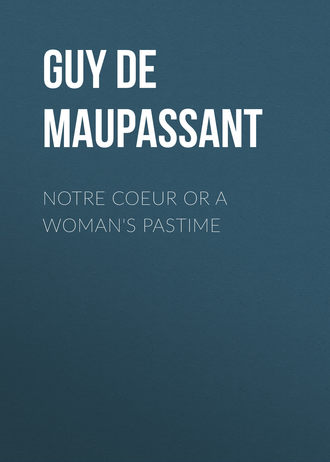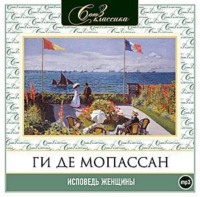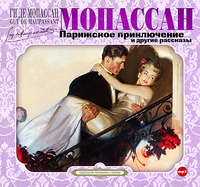 полная версия
полная версияNotre Coeur or A Woman's Pastime
Ah! that appointment at Auteuil! She had calculated the time on all the clocks of all her friends; she had watched the minutes that brought her nearer to it slip away at Mme. de Frémines's, at Mme. de Bratiane's, at pretty Mme. le Prieur's, on those afternoons when she killed time by roaming about Paris so as not to remain in her own house, where she might be detained by an inopportune visit or some other unforeseen obstacle.
She suddenly said to herself: "I will make to-day a day of rest; I will go there very late." Then she opened a little cupboard in the front of the carriage, concealed among the folds of black silk that lined the coupé, which was fitted up as luxuriously as a pretty woman's boudoir. The first thing that presented itself when she had thrown open the doors of this secret receptacle was a mirror playing on hinges that she moved so that it was on a level with her face. Behind the mirror, in their satin-lined niches, were various small objects in silver: a box for her rice-powder, a pencil for her lips, two crystal scent-bottles, an inkstand and penholder, scissors, a pretty paper-cutter to tear the leaves of the last novel with which she amused herself as she rolled along the streets. The exquisite clock, of the size and shape of a walnut, told her that it was four o'clock. Mme. de Burne reflected: "I have an hour yet, at all events," and she touched a spring that had the effect of making the footman who was seated beside the coachman stoop and take up the speaking-tube to receive her order. She pulled out the other end from where it was concealed in the lining of the carriage, and applying her lips to the mouthpiece of rock-crystal: "To the Austrian embassy!" she said.
Then she inspected herself in the mirror. The look that she gave herself expressed, as it always did, the delight that one feels in looking upon one's best beloved; then she threw back her furs to judge of the effect of her corsage. It was a toilette adapted to the chill days of the end of winter. The neck was trimmed with a bordering of very fine white down that shaded off into a delicate gray as it fell over the shoulders, like the wing of a bird. Upon her hat – it was a kind of toque – there towered an aigret of more brightly colored feathers, and the general effect that her costume inspired was to make one think that she had got herself up in this manner in preparation for a flight through the hail and the gray sky in company with Mother Carey's chickens.
She was still complacently contemplating herself when the carriage suddenly wheeled into the great court of the embassy.
Thereupon she arranged her wrap, lowered the mirror to its place, closed the doors of the little cupboard, and when the coupé had come to a halt said to her coachman: "You may go home; I shall not need you any more." Then she asked the footman who came forward from the entrance of the hotel: "Is the Princess at home?"
"Yes, Madame."
She entered and ascended the stairs and came to a small drawing-room where the Princess de Malten was writing letters.
The ambassadress arose with an appearance of much satisfaction when she perceived her friend, and they kissed each other twice in succession upon the cheek, close to the corner of the lips. Then they seated themselves side by side upon two low chairs in front of the fire. They were very fond of each other, took great delight in each other's society and understood each other thoroughly, for they were almost counterparts in nature and disposition, belonging to the same race of femininity, brought up in the same atmosphere and endowed with the same sensations, although Mme. de Malten was a Swede and had married an Austrian. They had a strange and mysterious attraction for each other, from which resulted a profound feeling of unmixed well-being and contentment whenever they were together. Their babble would run on for half a day on end, without once stopping, trivial, futile talk, interesting to them both by reason of their similarity of tastes.
"You see how I love you!" said Mme. de Burne. "You are to dine with me this evening, and still I could not help coming to see you. It is a real passion, my dear."
"A passion that I share," the Swede replied with a smile.
Following the habit of their profession, they put each her best foot foremost for the benefit of the other; coquettish as if they had been dealing with a man, but with a different style of coquetry, for the strife was different, and they had not before them the adversary, but the rival.
Madame de Burne had kept looking at the clock during the conversation. It was on the point of striking five. He had been waiting there an hour. "That is long enough," she said to herself as she arose.
"So soon?" said the Princess.
"Yes," the other unblushingly replied. "I am in a hurry; there is some one waiting for me. I would a great deal rather stay here with you."
They exchanged kisses again, and Mme. de Burne, having requested the footman to call a cab for her, drove away.
The horse was lame and dragged the cab after him wearily, and the animal's halting and fatigue seemed to have infected the young woman. Like the broken-winded beast, she found the journey long and difficult. At one moment she was comforted by the pleasure of seeing André, at the next she was in despair at the thought of the discomforts of the interview.
She found him waiting for her behind the gate, shivering. The biting blasts roared through the branches of the trees, the hailstones rattled on their umbrella as they made their way to the house, their feet sank deep into the mud. The garden was dead, dismal, miry, melancholy, and André was very pale. He was enduring terrible suffering.
When they were in the house: "Gracious, how cold it is!" she exclaimed.
And yet a great fire was blazing in each of the two rooms, but they had not been lighted until past noon and had not had time to dry the damp walls, and shivers ran through her frame. "I think that I will not take off my furs just yet," she added. She only unbuttoned her outer garment and threw it open, disclosing her warm costume and her plume-decked corsage, like a bird of passage that never remains long in one place.
He seated himself beside her.
"There is to be a delightful dinner at my house to-night," she said, "and I am enjoying it in anticipation."
"Who are to be there?"
"Why, you, in the first place; then Prédolé, whom I have so long wanted to know."
"Ah! Prédolé is to be there?"
"Yes; Lamarthe is to bring him."
"But Prédolé is not the kind of a man to suit you, not a bit! Sculptors in general are not so constituted as to please pretty women, and Prédolé less so than any of them."
"Oh, my friend, that cannot be. I have such an admiration for him!"
The sculptor Prédolé had gained a great success and had captivated all Paris some two months before by his exhibition at the Varin gallery. Even before that he had been highly appreciated; people had said of him, "His figurines are delicious"; but when the world of artists and connoisseurs had assembled to pass judgment upon his collected works in the rooms of the Rue Varin, the outburst of enthusiasm had been explosive. They seemed to afford the revelation of such an unlooked-for charm, they displayed such a peculiar gift in the translation of elegance and grace, that it seemed as if a new manner of expressing the beauty of form had been born to the world. His specialty was statuettes in extremely abbreviated costumes, in which his genius displayed an unimaginable delicacy of form and airy lightness. His dancing girls, especially, of which he had made many studies, displayed in the highest perfection, in their pose and the harmony of their attitude and motion, the ideal of female beauty and suppleness.
For a month past Mme. de Burne had been unceasing in her efforts to attract him to her house, but the artist was unsociable, even something of a bear, so the report ran. At last she had succeeded, thanks to the intervention of Lamarthe, who had made a touching, almost frantic appeal to the grateful sculptor.
"Whom have you besides?" Mariolle inquired.
"The Princess de Malten."
He was displeased; he did not fancy that woman. "Who else?"
"Massival, Bernhaus, and George de Maltry. That is all: only my select circle. You are acquainted with Prédolé, are you not?"
"Yes, slightly."
"How do you like him?"
"He is delightful; I never met a man so enamored of his art and so interesting when he holds forth on it."
She was delighted and again said: "It will be charming."
He had taken her hand under her fur cloak; he gave it a little squeeze, then kissed it. Then all at once it came to her mind that she had forgotten to tell him that she was ill, and casting about on the spur of the moment for another reason, she murmured: "Gracious! how cold it is!"
"Do you think so?"
"I am chilled to my very marrow."
He arose to take a look at the thermometer, which was, in fact, pretty low; then he resumed his seat at her side.
She had said: "Gracious! how cold it is!" and he believed that he understood her. For three weeks, now, at every one of their interviews, he had noticed that her attempt to feign tenderness was gradually becoming fainter and fainter. He saw that she was weary of wearing this mask, so weary that she could continue it no longer, and he himself was so exasperated by the little power that he had over her, so stung by his vain and unreasoning desire of this woman, that he was beginning to say to himself in his despairing moments of solitude: "It will be better to break with her than to continue to live like this."
He asked her, by way of fathoming her intentions: "Won't you take off your cloak now?"
"Oh, no," she said; "I have been coughing all the morning; this fearful weather has given me a sore throat. I am afraid that I may be ill." She was silent a moment, then added: "If I had not wanted to see you very much indeed I would not have come to-day." As he did not reply, in his grief and anger, she went on: "This return of cold weather is very dangerous, coming as it does after the fine days of the past two weeks."
She looked out into the garden, where the trees were already almost green despite the clouds of snow that were driving among their branches. He looked at her and thought: "So that is the kind of love that she feels for me!" and for the first time he began to feel a sort of jealous hatred of her, of her face, of her elusive affection, of her form, so long pursued, so subtle to escape him. "She pretends that she is cold," he said to himself. "She is cold only because I am here. If it were a question of some party of pleasure, some of those idiotic caprices that go to make up the useless existence of these frivolous creatures, she would brave everything and risk her life. Does she not ride about in an open carriage on the coldest days to show her fine clothes? Ah! that is the way with them all nowadays!"
He looked at her as she sat there facing him so calmly, and he knew that in that head, that dear little head that he adored so, there was one wish paramount, the wish that their tête-à-tête might not be protracted; it was becoming painful to her.
Was it true that there had ever existed, that there existed now, women capable of passion, of emotion, who weep, suffer, and bestow themselves in a transport, loving with heart and soul and body, with mouth that speaks and eyes that gaze, with heart that beats and hand that caresses; women ready to brave all for the sake of their love, and to go, by day or by night, regardless of menaces and watchful eyes, fearlessly, tremorously, to him who stands with open arms waiting to receive them, mad, ready to sink with their happiness?
Oh, that horrible love that which now held him in its fetters! – love without issue, without end, joyless and triumphless, eating away his strength and devouring him with its anxieties; love in which there was no charm and no delight, cause to him only of suffering, sorrow, and bitter tears, where he was constantly pursued by the intolerable regret of the impossibility of awaking responsive kisses upon lips that are as cold and dry and sterile as dead trees!
He looked at her as she sat there, so charming in her feathery dress. Were not her dresses the great enemy that he had to contend against, more than the woman herself, jealous guardians, coquettish and costly barriers, that kept him from his mistress?
"Your toilette is charming," he said, not caring to speak of the subject that was torturing him so cruelly.
She replied with a smile: "You must see the one that I shall wear to-night." Then she coughed several times in succession and said: "I am really taking cold. Let me go, my friend. The sun will show himself again shortly, and I will follow his example."
He made no effort to detain her, for he was discouraged, seeing that nothing could now avail to overcome the inertia of this sluggish nature, that his romance was ended, ended forever, and that it was useless to hope for ardent words from those tranquil lips, or a kindling glance from those calm eyes. All at once he felt rising with gathering strength within him the stern determination to end this torturing subserviency. She had nailed him upon a cross; he was bleeding from every limb, and she watched his agony without feeling for his suffering, even rejoicing that she had had it in her power to effect so much. But he would tear himself from his deathly gibbet, leaving there bits of his body, strips of his flesh, and all his mangled heart. He would flee like a wild animal that the hunters have wounded almost unto death, he would go and hide himself in some lonely place where his wounds might heal and where he might feel only those dull pangs that remain with the mutilated until they are released by death.
"Farewell, then," he said.
She was struck by the sadness of his voice and rejoined: "Until this evening, my friend."
"Until this evening," he re-echoed. "Farewell."
He saw her to the garden gate, and came back and seated himself, alone, before the fire.
Alone! How cold it was; how cold, indeed! How sad he was, how lonely! It was all ended! Ah, what a horrible thought! There was an end of hoping and waiting for her, dreaming of her, with that fierce blazing of the heart that at times brings out our existence upon this somber earth with the vividness of fireworks displayed against the blackness of the night. Farewell those nights of solitary emotion when, almost until the dawn, he paced his chamber thinking of her; farewell those wakings when, upon opening his eyes, he said to himself: "Soon I shall see her at our little house."
How he loved her! how he loved her! What a long, hard task it would be to him to forget her! She had left him because it was cold! He saw her before him as but now, looking at him and bewitching him, bewitching him the better to break his heart. Ah, how well she had done her work! With one single stroke, the first and last, she had cleft it asunder. He felt the old gaping wound begin to open, the wound that she had dressed and now had made incurable by plunging into it the knife of death-dealing indifference. He even felt that from this broken heart there was something distilling itself through his frame, mounting to his throat and choking him; then, covering his eyes with his hands, as if to conceal this weakness even from himself, he wept.
She had left him because it was cold! He would have walked naked through the driving snow to meet her, no matter where; he would have cast himself from the house top, only to fall at her feet. An old tale came to his mind, that has been made into a legend: that of the Côte des Deux Amans, a spot which the traveler may behold as he journeys toward Rouen. A maiden, obedient to her father's cruel caprice, which prohibited her from marrying the man of her choice unless she accomplished the task of carrying him, unassisted, to the summit of the steep mountain, succeeded in dragging him up there on her hands and knees, and died as she reached the top. Love, then, is but a legend, made to be sung in verse or told in lying romances!
Had not his mistress herself, in one of their earliest interviews, made use of an expression that he had never forgotten: "Men nowadays do not love women so as really to harm themselves by it. You may believe me, for I know them both." She had been wrong in his case, but not in her own, for on another occasion she had said: "In any event, I give you fair warning that I am incapable of being really smitten with anyone, be he who he may."
Be he who he may? Was that quite a sure thing? Of him, no; of that he was quite well assured now, but of another?
Of him? She could not love him. Why not?
Then the feeling that his life had been a wasted one, which had haunted him for a long time past, fell upon him as if it would crush him. He had done nothing, obtained nothing, conquered nothing, succeeded in nothing. When he had felt an attraction toward the arts he had not found in himself the courage that is required to devote one's self exclusively to one of them, nor the persistent determination that they demand as the price of success. There had been no triumph to cheer him; no elevated taste for some noble career to ennoble and aggrandize his mind. The only strenuous effort that he had ever put forth, the attempt to conquer a woman's heart, had proved ineffectual like all the rest. Take him all in all, he was only a miserable failure.
He was weeping still beneath his hands which he held pressed to his eyes. The tears, trickling down his cheeks, wet his mustache and left a salty taste upon his lips, and their bitterness increased his wretchedness and his despair.
When he raised his head at last he saw that it was night. He had only just sufficient time to go home and dress for her dinner.
CHAPTER X.
FLIGHT
André Mariolle was the first to arrive at Mme. de Burne's. He took a seat and gazed about him upon the walls, the furniture, the hangings, at all the small objects and trinkets that were so dear to him from their association with her – at the familiar apartment where he had first known her, where he had come to her so many times since then, and where he had discovered in himself the germs of that ill-starred passion that had kept on growing, day by day, until the hour of his barren victory. With what eagerness had he many a time awaited her coming in this charming spot which seemed to have been made for no one but her, an exquisite setting for an exquisite creature! How well he knew the pervading odor of this salon and its hangings; a subdued odor of iris, so simple and aristocratic. He grasped the arms of the great armchair, from which he had so often watched her smile and listened to her talk, as if they had been the hands of some friend that he was parting with forever. It would have pleased him if she could not come, if no one could come, and if he could remain there alone, all night, dreaming of his love, as people watch beside a dead man. Then at daylight he could go away for a long time, perhaps forever.
The door opened, and she appeared and came forward to him with outstretched hand. He was master of himself, and showed nothing of his agitation. She was not a woman, but a living bouquet – an indescribable bouquet of flowers.
A girdle of pinks enclasped her waist and fell about her in cascades, reaching to her feet. About her bare arms and shoulders ran a garland of mingled myosotis and lilies-of-the-valley, while three fairy-like orchids seemed to be growing from her breast and caressing the milk-white flesh with the rosy and red flesh of their supernal blooms. Her blond hair was studded with violets in enamel, in which minute diamonds glistened, and other diamonds, trembling upon golden pins, sparkled like dewdrops among the odorous trimming of her corsage.
"I shall have a headache," she said, "but I don't care; my dress is becoming."
Delicious odors emanated from her, like spring among the gardens. She was more fresh than the garlands that she wore. André was dazzled as he looked at her, reflecting that it would be no less brutal and barbarous to take her in his arms at that moment than it would be to trample upon a blossoming flower-bed. So their bodies were no longer objects to inspire love; they were objects to be adorned, simply frames on which to hang fine clothes. They were like birds, they were like flowers, they were like a thousand other things as much as they were like women. Their mothers, all women of past and gone generations, had used coquettish arts to enhance their natural beauties, but it had been their aim to please in the first place by their direct physical seductiveness, by the charm of native grace, by the irresistible attraction that the female form exercises over the heart of the males. At the present day coquetry was everything. Artifice was now the great means, and not only the means, but the end as well, for they employed it even more frequently to dazzle the eyes of rivals and excite barren jealousy than to subjugate men.
What end, then, was this toilette designed to serve, the gratification of the eyes of him, the lover, or the humiliation of the Princess de Malten?
The door opened, and the lady whose name was in his thoughts was announced.
Mme. de Burne moved quickly forward to meet her and gave her a kiss, not unmindful of the orchids during the operation, her lips slightly parted, with a little grimace of tenderness. It was a pretty kiss, an extremely desirable kiss, given and returned from the heart by those two pairs of lips.
Mariolle gave a start of pain. Never once had she run to meet him with that joyful eagerness, never had she kissed him like that, and with a sudden change of ideas he said to himself: "Women are no longer made to fulfill our requirements."
Massival made his appearance, then M. de Pradon and the Comte de Bernhaus, then George de Maltry, resplendent with English "chic."
Lamarthe and Prédolé were now the only ones missing. The sculptor's name was mentioned, and every voice was at once raised in praise of him. "He had restored to life the grace of form, he had recovered the lost traditions of the Renaissance, with something additional: the sincerity of modern art!" M. de Maltry maintained that he was the exquisite revealer of the suppleness of the human form. Such phrases as these had been current in the salons for the last two months, where they had been bandied about from mouth to mouth.
At last the great man appeared. Everyone was surprised. He was a large man of uncertain age, with the shoulders of a coal-heaver, a powerful face with strongly-marked features, surrounded by hair and beard that were beginning to turn white, a prominent nose, thick full lips, wearing a timid and embarrassed air. He held his arms away from his body in an awkward sort of way that was doubtless to be attributed to the immense hands that protruded from his sleeves. They were broad and thick, with hairy and muscular fingers; the hands of a Hercules or a butcher, and they seemed to be conscious of being in the way, embarrassed at finding themselves there and looking vainly for some convenient place to hide themselves. Upon looking more closely at his face, however, it was seen to be illuminated by clear, piercing, gray eyes of extreme expressiveness, and these alone served to impart some degree of life to the man's heavy and torpid expression. They were constantly searching, inquiring, scrutinizing, darting their rapid, shifting glances here, there, and everywhere, and it was plainly to be seen that these eager, inquisitive looks were the animating principle of a deep and comprehensive intellect.
Mme. de Burne was somewhat disappointed; she politely led the artist to a chair which he took and where he remained seated, apparently disconcerted by this introduction to a strange house.
Lamarthe, master of the situation, approached his friend with the intention of breaking the ice and relieving him from the awkwardness of his position. "My dear fellow," he said, "let me make for you a little map to let you know where you are. You have seen our divine hostess; now look at her surroundings." He showed him upon the mantelpiece a bust, authenticated in due form, by Houdon, then upon a cabinet in buhl a group representing two women dancing, with arms about each other's waists, by Clodion, and finally four Tanagra statuettes upon an étagère, selected for their perfection of finish and detail.








